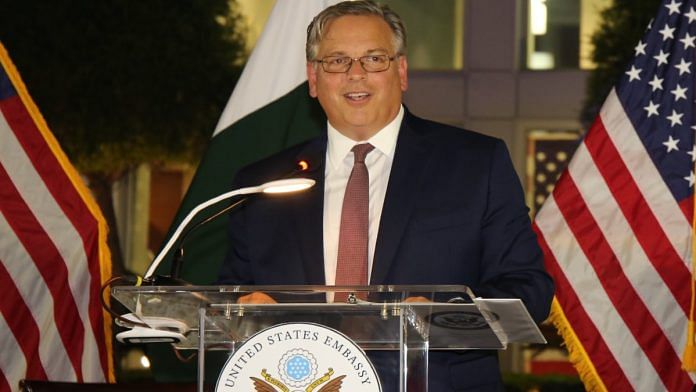New Delhi: US Ambassador to Pakistan Donald Blome’s secret visits to the Gilgit Baltistan region and the Gwadar port this month have stoked controversy in the neighbouring country, with political leaders questioning the envoy’s “suspicious” motives and accusing the West of neo-colonialism.
Blome went on a six-day visit to Gilgit Baltistan and Hunza Valley last week. However, the visit was kept unusually under wraps, with neither the US embassy in Pakistan nor the regional government announcing the visit.
The envoy also secretly visited the China-funded Gwadar port in Balochistan province earlier this month, becoming the first US ambassador to visit the port in 17 years.
Gilgit Baltistan has been a disputed region between India and Pakistan since 1947, and between India and China since 1959. It is the only land route between Islamabad and Beijing, meeting at the Xinjiang Autonomous Region, and is often considered the heart of the Belt and Road Initiative (BRI) in Pakistan. The region, currently occupied by Pakistan — an occupation India considers as illegal — has special administrative provisions including its own Constitution that sets out its powers and their limits with respect to Pakistan.
Blome had visited Gilgit Baltistan (G-B) for three days last year as well. Throughout that visit, he had reportedly referred to Pakistan Occupied Kashmir or PoK as ‘AJK’ (Azad Jammu and Kashmir). While India has yet to react to his latest visit, it had registered its protest with US authorities last year as New Delhi views the region as having been forcibly taken over by Pakistan in 1947.
After Blome’s latest visits, Kazim Mesum, opposition leader in the Gilgit Baltistan assembly, questioned the motivations behind them, as well as the “mysterious activities” of the envoy.
“There is a set procedure for any country’s ambassador to visit the region,” he said, while calling Blome’s coming to Gilgit after visiting Gwadar “suspicious”.
Former Senate chairman and Pakistan People’s Party (PPP) leader Mian Raza Rabbani also called out the envoy’s visit, hinting at Western influence and interference into domestic affairs through visits to strategic regions as well as bailout packages.
“The financial imperialists first got their conditionalities accepted in various agreements that comprised Pakistan’s financial sovereignty. Now they treat Pakistan as part of the Raj and have started to dictate the political and constitutional arrangements,” Rabbani said Monday, while indicating that modern day “colonial masters” had “invaded Pakistan”.
During this visit, Blome met with numerous local representatives and G-B government officials. He also met Food and Tourism Minister Ghulam Muhammad in Gilgit, according to a report in Dawn.
Amid the uproar over the visit, the US Embassy issued a statement that read: “Gilgit and Hunza Valley are unique mountain and glacial ecosystems that feed the Indus River Valley. The region is particularly vulnerable to climate change impacts.” It also said that ambassador Blome’s trips were conducted in close contact with the Pakistan government.
Responding to Blome’s visit, US envoy to India Eric Garcetti said Tuesday that the issue must be “resolved between India and Pakistan, not by any third party including the US”.
Also Read: Who decides Pakistan poll dates, president or poll panel? The latest in Pakistan election imbroglio
Significance of Gilgit Baltistan
India considers the G-B region as its territory, a part of the former princely state of Jammu and Kashmir after Hari Singh, then ruler of Gilgit Baltistan, signed the Instrument of Accession with India in 1947.
However, after a rebellion broke out against Singh, a local political outfit called the Revolutionary Council of Gilgit-Baltistan proclaimed it as an independent state. Eventually, the group accepted accession from Pakistan.
In 2020, then Pakistan prime minister Imran Khan attempted to give the region ‘provisional provincial status’, which has not taken place yet, after strong opposition from India. New Delhi accused Khan of attempting “to bring material changes to a part of Indian territory under its illegal and forcible occupation”.
Not Blome’s first controversy this year
This is not the first Blome’s actions have stoked controversy this year. Last month, the US envoy met Chief Election Commissioner (CEC) Sikandar Sultan Raja and reaffirmed Washington’s support for free and fair elections in Pakistan. The meeting invited criticism that it was interference in the internal affairs of the country, according to a report in Dawn.
This meeting came amid uncertainty over when the next general elections will be held in the country. While Pakistan was due to hold elections in November this year, polls have been postponed until the Election Commission of Pakistan completes the mandatory delimitation exercise across the country.
UK Commissioner to Pakistan Jane Marriott had also met with the CEC, which received flak from various opposition leaders.
(Edited by Gitanjali Das)
Also Read: Pakistani Generals have a dilemma—keeping Imran Khan out can destabilise country’s politics



